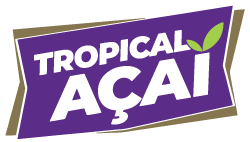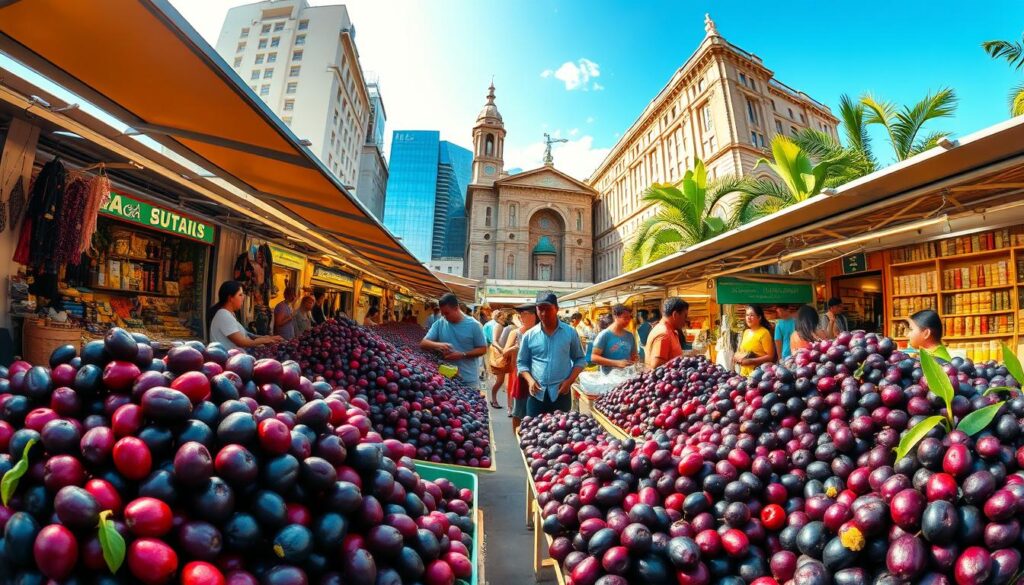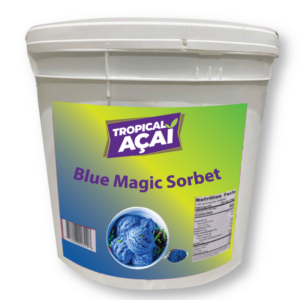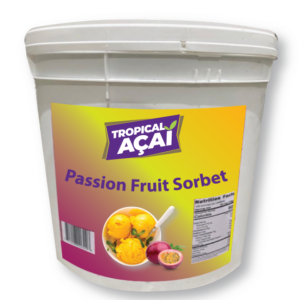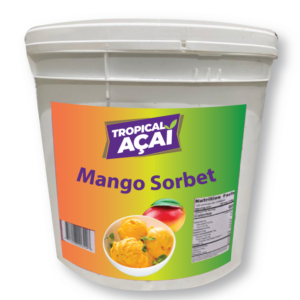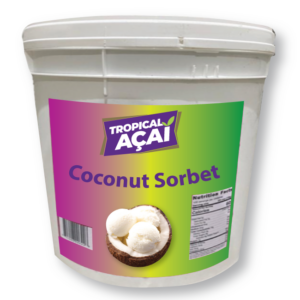Acai certification could revolutionize your business in the superfood market. This guide covers the essentials of Acai certification. You’ll learn how to make smart choices and boost your brand.
Certification is crucial for standing out in the health industry. It builds trust with health-conscious buyers. Tropical Acai, a top supplier, can help you get certified.
Acai certification is more than just a label. It’s a tool for increasing your product’s appeal and showing customers you care about ethics and sustainability.
Certification costs may seem high at first, but they’re worth it to protect your investment. Startup costs for an acai bowl business can reach $50,000.
Certification helps you stand out from competitors. It opens new doors and builds a supply chain customers trust.
Key Takeaways
- Acai certification builds trust and brand loyalty
- Certified products align with consumer demand for ethical options
- Certification enhances product marketability and perception
- It differentiates your brand in a competitive market
- Certification supports a reliable and sustainable supply chain
- Initial investment can yield significant long-term benefits
Understanding the Fundamentals of Acai Business
The acai business offers exciting chances in the health food industry. Understanding the acai market is key to your success. It’s a world full of potential for entrepreneurs.
The Global Acai Market Overview
Demand for premium acai has soared worldwide, with frozen acai leading the way. This superfood is popular due to its rich nutrients, antioxidants, fiber, and healthy fats.
The market offers various products, such as acai bowls, juices, and supplements, to cater to different consumer tastes and preferences.
Why Acai Certification Matters
Acai certification sets you apart in a competitive market. It ensures your products meet high-quality standards, building consumer trust. Certified organic acai products can boost your sales by up to 30%.
Key Market Trends and Opportunities
The acai business is booming due to increased superfood demand and focus on sustainability. New products inspired by acai’s Brazilian roots can appeal to diverse customers.
Partnering with trusted suppliers like Tropical Acai ensures consistent quality, which opens up exciting growth opportunities in the market.
| Aspect | Impact on Acai Business |
|---|---|
| Product Diversity | Offers multiple revenue streams |
| Sustainability | Attracts environmentally conscious consumers |
| Quality Certification | Builds trust and increases sales |
| Cultural Inspiration | Creates unique marketing opportunities |
Getting Started with Acai Certification
The acai market is booming, valued at $722 million in 2019. It’s growing at 12.6% annually, making certification a smart move. Acai Certification opens doors to this thriving industry.
Start by finding top-notch wholesale acai suppliers. Tropical Acai offers non-GMO, Kosher, and FSSC 22000-certified products. These certifications ensure you’re using the best ingredients available.
Learn the certification requirements. These include organic standards, food safety rules, and quality control measures. Sustainable harvesting practices are also important.
- Organic certification standards
- Food safety regulations
- Quality control measures
- Sustainable harvesting practices
Prepare for inspections and audits. Keep detailed records of your sourcing and processing methods, and document all quality control procedures.
Certification goes beyond paperwork. It’s about committing to excellence in your acai business. This focus on quality sets you apart in the market.
Acai Certification shows that you’re a trusted provider. It proves your commitment to quality, sustainability, and ethical practices, which are increasingly important to consumers.
Quality Standards and Compliance Requirements
High quality and compliance are vital in the acai business. This section covers key requirements for organic acai products. We’ll explore how to meet consumer expectations and regulatory demands.
Organic Certification Standards
USDA NOP certification is needed to market organic acai. It ensures your acai is produced without synthetic pesticides or fertilizers. The process involves strict inspections and documentation of farming and processing methods.
Food Safety Regulations
Food safety regulations are essential. An HACCP system helps manage safety hazards in acai production. BRC Start! Certification shows your commitment to food safety for small—to medium-sized businesses.
Quality Control Measures
Consistent quality is crucial in the organic acai market. Here are some quality control measures to consider:
- Implement ISO 9001:215 standards for quality management
- Conduct regular product testing for purity and nutrient content
- Train staff in proper handling and processing techniques
- Establish traceability systems from farm to consumer
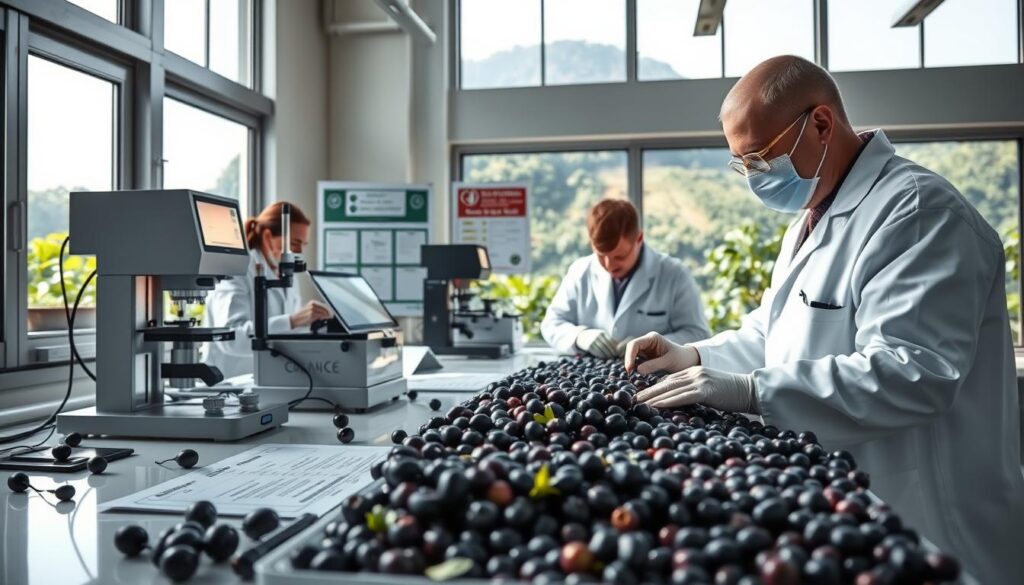
| Certification | Focus Area | Benefit |
|---|---|---|
| USDA NOP | Organic Production | Consumer Trust |
| HACCP | Food Safety | Risk Mitigation |
| ISO 9001:215 | Quality Management | Process Improvement |
Follow these standards and use firm quality control. You’ll become a trusted provider of premium organic acai products. This approach will help you stand out in the health food market.
Sourcing Premium Acai Products
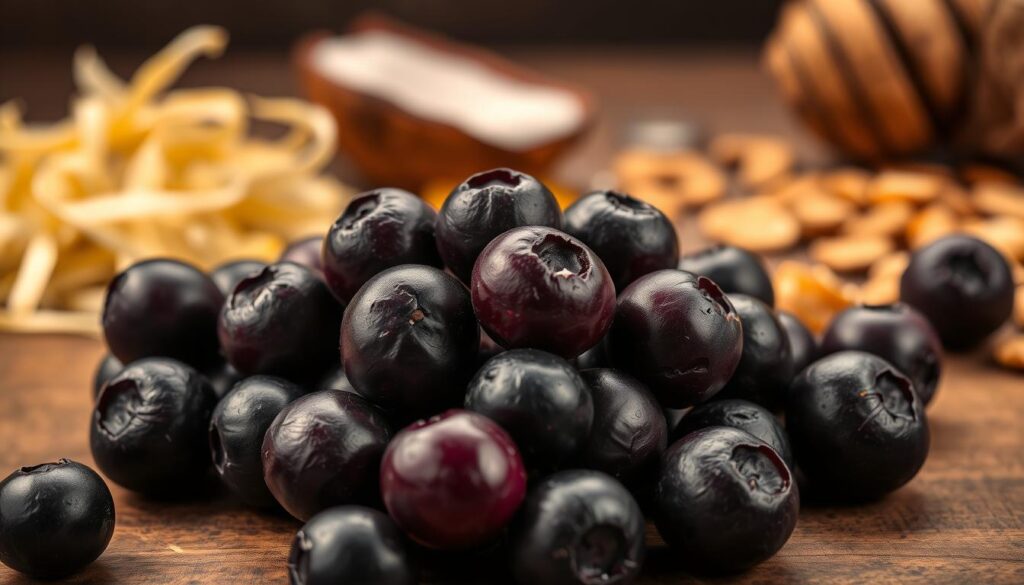
High-quality acai is key to your business’s success. Industry leaders like Tropical Acai offer premium products that meet strict standards. Their acai aligns with consumer preferences and regulatory requirements.
Look for suppliers with USDA Organic, Non-GMO Project Verified, and Kosher certifications. These ensure you’re getting top-notch acai for your customers. Premium acai should have a smooth, rich flavor and maintain its nutritional value.
When sourcing acai, consider product variety and customizable orders. Cold-chain logistics, sustainability practices, and ethical sourcing are also important factors. Customer support and marketing assistance can help grow your business.
A reputable wholesale acai supplier ensures consistent quality and reliable delivery. They provide the support you need to thrive in this competitive market. Premium acai products form the foundation of your success.
- Product variety (puree, sorbet, powder)
- Customizable orders and flexible delivery options
- Cold-chain logistics for product freshness
- Sustainability practices and ethical sourcing
- Customer support and marketing assistance
Essential Documentation and Paperwork
Acai Certification demands careful attention to paperwork. Understanding the essential documents is crucial for becoming a certified organic acai provider. This process requires meticulous preparation and organization.
Required Legal Documents
Gathered critical legal documents for Acai Certification. These include business licenses, proof of land ownership, and tax identification papers. For organic certification, prepare detailed records of farming practices and supply chain.
Certification Application Process
The Acai Certification application involves several steps. You’ll submit a detailed form about your operations with supporting documents. Provide information on acai sourcing, processing methods, and quality control measures.
The USDA National Organic Program (NOP) standards guide the organic certification. Follow these guidelines closely to ensure a smooth application process.

Record Keeping Requirements
Maintaining excellent records is vital for Acai Certification. Keep detailed logs of harvests, processing procedures, and sales transactions. For organic acai, document all production inputs and maintain a clear custody chain.
These records support your certification and aid in quality assurance. They also contribute to business growth and demonstrate your commitment to excellence.
- Harvest and processing logs
- Supplier agreements
- Sales and inventory records
- Employee training documents
- Quality control reports
Thorough documentation is key to successful Acai Certification. It showcases your dedication to quality and compliance. This attention to detail sets you apart in the competitive organic acai market.
Building Your Acai Business Model
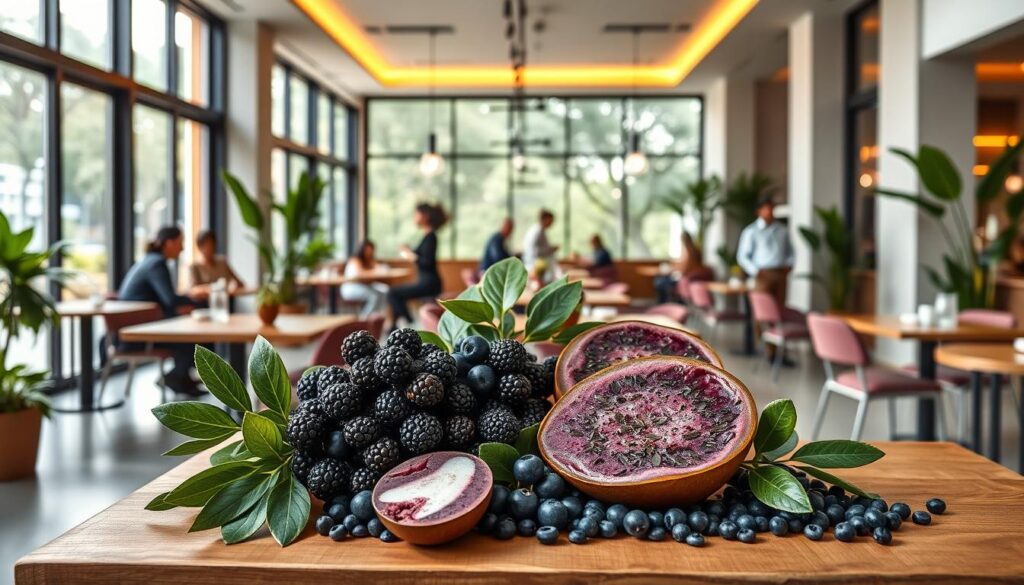
A solid model is key to a successful acai business. Focus on high-quality products and unique offerings to help your venture thrive. Initial investments range from $10,000 to $50,000 for essential equipment and supplies.
Premium acai forms the foundation of your menu. Price bowls are between $7 and $15 for 30% to 50% profit margins. Create signature recipes and highlight health benefits to stand out.
Choose your location wisely. Target areas near gyms, universities, or beaches to attract health-conscious customers. Build strong supplier relationships to ensure fresh, premium acai and toppings.
| Key Expense | Description |
|---|---|
| Refrigeration | Commercial-grade units for storing acai and fruits |
| Blenders | High-powered for smooth acai bowls |
| Ingredients | Acai puree, fresh fruits, granola, premium toppings |
| Serving Bowls | Eco-friendly, branded options |
Use Instagram to showcase your visually appealing acai creations. Implement SEO strategies and partner with influencers to boost online visibility. Your dedication to quality and sustainability will set you apart in this market.
Understanding Supply Chain Management
Mastering supply chain management is vital for your wholesale acai business. Efficient handling ensures that your customers receive top-quality products. Let’s explore key aspects of managing your acai supply chain.
Storage and Handling Requirements
Proper storage maintains the quality of your wholesale acai. Keep products refrigerated to preserve freshness. Use specialized cold chain logistics for transportation.
This approach guarantees your organic acai arrives in perfect condition.
Distribution Networks
Build a strong distribution network for your acai products. Partner with reliable shipping companies experienced in handling perishable goods. Implement real-time tracking systems to monitor your shipments.
This ensures timely delivery and reduces product spoilage risk.
Quality Assurance Throughout the Chain
Maintain high standards across your entire supply chain. Conduct regular inspections and testing of your wholesale acai. Work with suppliers who hold relevant certifications like USDA Organic.
Fair Trade and Rainforest Alliance certifications vouch for quality and ethical sourcing.
| Supply Chain Element | Best Practice |
|---|---|
| Sourcing | Direct from Brazilian rainforests |
| Transportation | Refrigerated shipping |
| Quality Control | Regular inspections and testing |
| Inventory Management | Advanced software with real-time tracking |
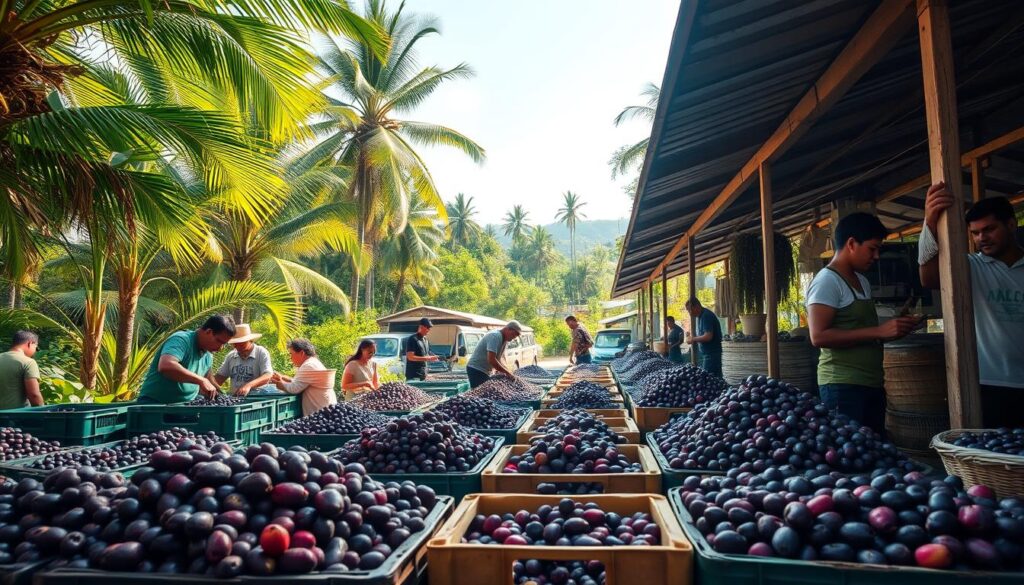
These strategies create a reliable supply chain for your organic acai business. This approach ensures consistent quality and builds customer trust. It sets your brand apart in the competitive acai market.
Marketing Certified Acai Products
Your acai certification builds trust with consumers. It sets you apart in the competitive superfood market. Now, it’s time to showcase your premium acai products to the world.
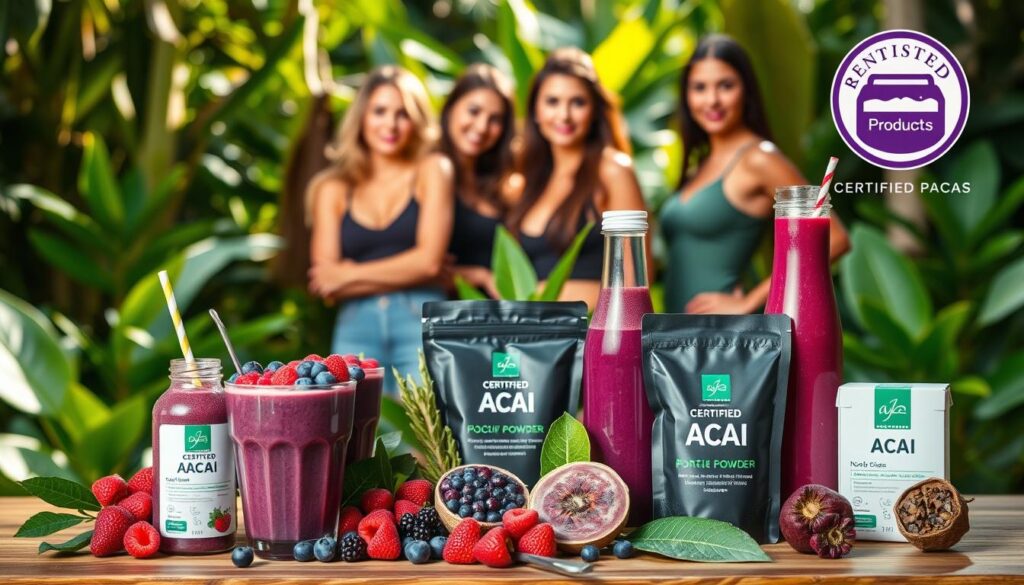
Highlight your high-quality acai’s unique qualities in marketing campaigns. Emphasize its creamier texture and intense natural flavor without additives. Showcase your organic and Fair Trade certifications.
These certifications ensure pesticide-free products and fair compensation for producers. Use these impressive statistics in your marketing efforts:
- The acai market is projected to reach USD 2,217.3 million by 2030, with North America accounting for 35% of demand
- 70% of Americans seek foods rich in antioxidants, creating high demand for acai products
- 90% of consumers recognize acai’s health benefits, driving product appeal
Create campaigns that educate consumers about the benefits of certified acai products. Use social media, local partnerships, and health-focused events to reach your audience. To showcase acai’s versatility, offer customizable bowls, smoothies, and creative recipes.
Your high-quality acai is a lifestyle choice for health-conscious customers. Effectively communicate the value of your certified acai products. This will create a strong brand identity that resonates with your audience.
Financial Planning and Investment
Starting an acai business needs careful financial planning. Acai Certification costs and wholesale purchases are crucial for success. Let’s look at the money side of your new venture.
Certification Costs
Acai Certification expenses can vary widely. Initial costs may range from $5,000 to $15,000. This covers application fees, inspections, and upgrades to meet standards.
Operating Expenses
Your main costs will be wholesale acai, storage, and transportation. Raw materials alone may cost $50,000 to $100,000 yearly. Labor, utilities, and marketing can add another $75,000 to $150,000 annually.
Revenue Projections
The acai market is on the rise. With good planning, first-year revenues could reach $200,000 to $500,000. As your brand becomes known, this can grow by 20-30% yearly.
Your profit margins may range from 15% to 25%. This depends on your pricing and how well you run things.
| Year | Projected Revenue | Estimated Profit |
|---|---|---|
| 1 | $200,000 – $500,000 | $30,000 – $125,000 |
| 2 | $240,000 – $650,000 | $36,000 – $162,500 |
| 3 | $288,000 – $845,000 | $43,200 – $211,250 |
Keep in mind that these numbers are just estimates. Your results may differ based on market conditions, and your business model and management skills also play a big role.
Acai Certification Standards and Processes
Acai Certification ensures quality and sustainability in organic acai production. It sets strict standards for environmental conservation, fair trade, and human rights. These rigorous requirements maintain high-quality acai products.
Certified acai agroforestry areas show impressive biodiversity. They have 50% more tree species than non-certified groves, and the trees in these areas are older and more established.
The certification process for organic acai involves several steps, including environmental assessment, fair trade evaluation, and checks of human rights compliance. Quality control measures are also implemented.
- Environmental assessment
- Fair trade practices evaluation
- Human rights compliance check
- Quality control measures implementation
Maintaining Acai Certification requires ongoing improvement and ethical practices. Regular audits and compliance with hygiene standards are essential. Compliance with international vegan standards may also apply.
Certification benefits go beyond environmental protection. Certified acai products often gain recognition for quality and sustainability. Some producers achieve high ratings in the IFS Food V8 certification.
Understanding these standards will position your business as a trusted provider. You’ll be known for high-quality, sustainable organic acai products, which can give you an edge in the market.
Training and Staff Development
Your team’s expertise can make or break your premium acai business. Investing in training and staff development is crucial. It maintains high-quality acai standards and ensures customer satisfaction.
Employee Certification Requirements
Staff should meet specific certification requirements to guarantee the best handling of high-quality acai. These certifications vary based on roles within your organization:
- Acai Handlers: Basic food safety and hygiene certification
- Production Staff: Advanced acai processing techniques certification
- Quality Control: Specialized acai quality assessment certification
- Management: Acai business operations and compliance certification
Ongoing Education Programs
Continuous learning is key to staying ahead in the premium acai market. Implement these ongoing education initiatives:
- Monthly workshops on acai nutritional benefits
- Quarterly seminars on sustainable acai harvesting practices
- Annual conference attendance for industry updates
- Regular tastings to refine palate for premium acai products
Prioritizing staff development invests in your team and safeguards product quality. It builds a reputation for excellence in the premium acai industry.
| Training Area | Frequency | Impact on Business |
|---|---|---|
| Food Safety | Quarterly | Ensures proper handling of high-quality acai |
| Customer Service | Monthly | Improves customer satisfaction and retention |
| Product Knowledge | Bi-weekly | Enhances ability to promote premium acai products |
| Sustainability Practices | Annually | Supports ethical sourcing of premium acai |
Maintaining Certification Compliance
Securing Acai Certification is just the start. The real test is keeping up with compliance. This ensures your organic acai business stays strong and healthy.
Regular audits and careful record-keeping are vital. Strong quality control helps you maintain your certified status. It is also crucial to stay current with organic acai rules.
As standards change, your business must adapt. Make compliance part of your daily work. This helps you meet and beat certification needs.
The road to compliance is different for each business. Some make it in 3 weeks, others in 18 months. On average, it takes about 3 months.
Your journey will include planning and readiness checks. You’ll also implement changes, gather proof, and undergo audits. Reporting and ongoing upkeep are also part of the process.
- Systematic controls: 10-35% of compliance activities
- Policies, procedures, and plans: 20-35%
- Event-driven activities: 15-30%
- Periodic meetings and reviews: 20-30%
- Ad-hoc items: ~10%
Maintaining Acai Certification gets easier with time. Set it up right and make it part of your business. Your dedication to compliance will please regulators and build customer trust.
Risk Management and Quality Assurance
Protecting your high-quality acai business requires strong risk management and quality assurance. Effective strategies safeguard your premium products and maintain customer trust. Implementing these practices is crucial for long-term success.
Quality Control Procedures
Rigorous quality control is vital for consistently high-quality acai. Regular product testing and supplier audits are key components. Following food safety regulations is also essential for a comprehensive quality control system.
Risk Assessment Protocols
A thorough risk assessment helps identify potential threats to your acai business. It also evaluates supply chain vulnerabilities and market fluctuations. This proactive approach allows you to address risks before they impact operations.
Emergency Response Planning
A detailed emergency response plan is crucial for unforeseen challenges. Outline steps for handling product recalls and supply chain disruptions. Quick responses protect your business reputation and customer well-being.
Prioritizing risk management and quality assurance builds a resilient acai business. It ensures the consistent delivery of premium products. Maintaining high standards is essential in the competitive acai market.
| Quality Assurance Activity | Frequency | Impact on Premium Acai |
|---|---|---|
| Product Testing | Weekly | Ensures consistent quality |
| Supplier Audits | Quarterly | Maintains supply chain integrity |
| Risk Assessments | Bi-annually | Identifies potential threats |
| Emergency Drills | Annually | Preparation for unexpected events |
Future Growth and Expansion Strategies
The acai industry offers numerous growth opportunities. As a wholesale acai entrepreneur, you can tap into this booming sector. The global organic acai powder market will exceed $500 million by 2028.
Diversify your product line to capitalize on this growth. The food and beverage sector leads the market. Acai powder is popular in smoothies and energy bars.
The personal care segment is expanding rapidly. Acai extract is valued for its anti-aging properties in skincare products.
Expanding into new markets is vital. North America dominates, but Asia-Pacific shows the fastest growth. The Middle East and Africa offer untapped potential.
E-commerce platforms can help you reach these markets efficiently. Focus on sustainability and ethical sourcing, and invest in digital marketing and social media.
Develop new applications for acai products. Explore partnerships with influencers and complementary businesses.
Partner with a reliable wholesale acai supplier. To succeed in this growing market, maintain high-quality standards. Adapt to trends while remaining committed to quality.
Conclusion
This Acai Certification guide offers valuable insights into the thriving organic acai industry. The global market is expanding rapidly, and with proper quality assurance and consumer trust, your certified acai business is set for success.
You now know how to source premium products and manage the supply chain. You also understand how to implement rigorous quality control measures. The acai berry’s rich antioxidants and essential fatty acids make it valuable in nutrition and skincare.
The acai industry has great potential. With good planning, businesses can reach $4 million in annual revenue within five years. For long-term success, focus on innovation, sustainability, and following FDA and EFSA rules.
Your Acai Certification and new expertise prepare you for the growing health-conscious market. The future of acai is promising. You’re now ready to excel in this exciting and rewarding field.
FAQ
What is Acai Certification, and why is it important?
Acai Certification verifies the quality and safety of acai products. It builds trust with consumers and ensures compliance with industry standards. This certification sets your business apart in the competitive superfood market.
How can I source high-quality acai for my business?
Partner with reputable wholesale acai suppliers like Tropical Acai. They offer organic acai products that meet strict quality standards. These suppliers can support your certification efforts.
What are the key steps in obtaining Acai Certification?
Understand certification requirements and source quality acai. Prepare necessary documentation and undergo inspections. Implement quality control measures and maintain compliance with organic standards.
How long does the Acai Certification process typically take?
The process generally takes several months to complete, including time for application preparation, inspections, and review. Working with experienced suppliers can help streamline the process.
What are the costs associated with Acai Certification?
Application fees, inspection expenses, and ongoing compliance costs are included. The investment varies depending on your business size and scope. Factor these into your financial planning for long-term success.
How can I maintain my Acai Certification once obtained?
Consistently adhere to quality standards and conduct regular internal audits. Keep detailed records and stay updated with industry regulations. Ensure your staff is well-trained in handling premium acai products.
What marketing strategies work best for certified acai products?
Highlight your certification status and educate consumers about the benefits of high-quality acai. Use social media to showcase your premium products. Partner with health and wellness influencers.
How does working with a wholesale acai supplier benefit my certification process?
Partnering with reputable suppliers ensures a consistent supply of high-quality, organic acai. These suppliers can provide documentation to support your certification application and offer expertise on industry standards and best practices.
What are the key quality control measures for acai products?
Conduct rigorous testing for purity and potency. Implement proper storage and handling procedures. Perform regular product inspections and maintain a clean processing environment.
How can I train my staff to uphold Acai Certification standards?
Implement comprehensive training programs covering acai handling and quality control procedures. Encourage ongoing education in food safety. Consider employee certification in organic handling.
What future trends should I be aware of in the acai industry?
Watch for increased demand for organic and premium acai products. Monitor innovative acai-based product development. Note the growing interest in sustainable and ethically sourced superfoods.
How can I expand my certified acai business?
Diversify your product line with new acai offerings. Explore new market segments and scale operations while maintaining quality. Use your certification to enter new distribution channels or markets.
